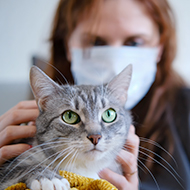"Our advice to pet owners who have COVID-19 or who are self-isolating with symptoms remains to restrict contact with their pets as a precautionary measure" - Daniella Dos Santos, BVA.
Researchers say pets could act as a reservoir of the virus.
COVID-19 is common in domestic cats and dogs whose owners have contracted the disease, according to new research.
The study by researchers at Utrecht University in the Netherlands took samples from 310 pets in 196 households where owners had tested positive for COVID-19. Of these, seven dogs and six cats tested positive, while 54 of the animals tested positive for virus antibodies.
Until now, there have been no reported cases of pet-to-human transmission of COVID-19. However, researchers are warning pet owners who contract the disease to avoid contact with their pets.
"If you have Covid, you should avoid contact with your cat or dog, just as you would do with other people," Dr Els Broens from Utrecht University told BBC News. "The main concern is not the animals' health but the potential risk that pets could act as a reservoir of the virus and reintroduce it into the human population."
In the study, researchers sent a mobile vet clinic to households in the Netherlands that had tested positive for COVID-19 within the past 200 days. Of the cats and dogs tested, 4.2 per cent showed evidence of a current infection, while 17.4 per cent tested positive for antibodies.
The team believes that the most likely route of transmission is from human to animal. The study found that most infected pets tend to be asymptomatic or display mild Covid symptoms.
"We can't say there is a 0 per cent risk of owners catching Covid from their pets," Dr Broens continued. "At the moment, the pandemic is still being driven by human-to-human infections, so we just wouldn't detect it."
BVA response
Responding to the study, BVA senior vice president Daniella Dos Santos, said: “While pet cats and dogs may be susceptible to the virus that causes COVID-19 in humans, the most likely route of transmission is from an infected human to their pet animal, as the authors of this new study reiterate. There is no evidence that pets are passing Covid-19 to their owners.
“Our advice to pet owners who have COVID-19 or who are self-isolating with symptoms remains to restrict contact with their pets as a precautionary measure and to practise good hygiene, including regular handwashing. If your pet requires care, wash your hands before and after any interaction with them and wear a face mask if possible.
“We also recommend that owners who are confirmed or suspected to have COVID-19 should keep their cat indoors if possible, but only if the cat is happy to be kept indoors. Some cats cannot stay indoors due to stress-related medical reasons.
“Most infected pets have no or mild symptoms, but owners should contact their local veterinary practice for advice in case they suspect their pet to be ill.”
The findings from this study were presented at the European Congress of Clinical Microbiology and Infectious Diseases (ECCMID) but are not yet published.








